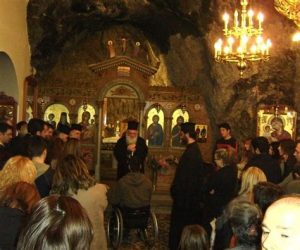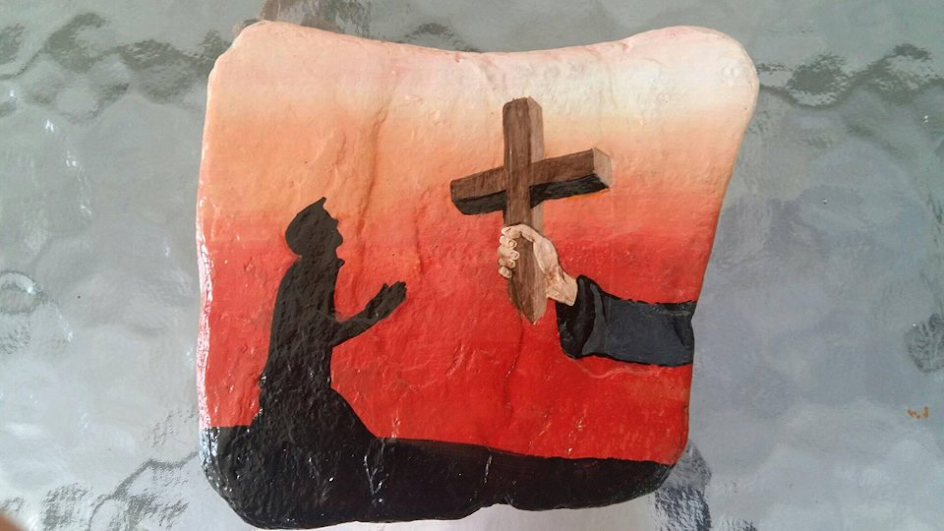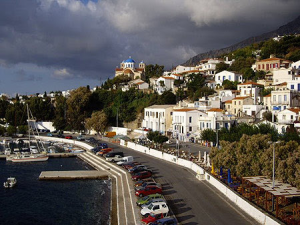Προσευχή … μετάνοια. .. προσκύνημα. .. και η δύναμη του τιμιου σταυρού μέσω του πατερ Δημητριου!
translated: Prayer… regret… Pilgrimage… and the power of the cross. . . cross through my father said!
A paradise of healing spas.
With about 800 locations of natural curative resources, most of which are water-related, Greece could be described as a paradise of healing spas. Still, most remain undeveloped: only 34 springs have been officially recognized so far, while recognition of another 60 is pending. Meanwhile, few of them have onsite lodgings. Over the last few years, as holistic medicine has once again become a topic of discussion for the scientific community.
There has been rekindled interest in developing these springs by creating high-end hydrotherapy facilities and hotels that focus on balneotherapy, not only as a treatment for specific ailments, not only, illnesses and injuries, but to promote general wellbeing.
The Greeks were among the first to discover the beneficial properties of water.
They used it not only for cleanliness and therapy, but also for relaxation. At first, unable to understand the actual curative capability of water, they (like other ancient people, such as the Egyptians, Babylonians, Persians and Indians.) Simply worshiped it as a deity and ascribed supernatural and magical powers to it. During the 6th and 5th centuries BC, the ancient Greeks used healing water for the first time in medicine, as practiced then, at the Asclepieia.
These were both places of worship and healing centers dedicated to the god Asclepius. Treatment included washing, hot or cold baths, diet, exercise and entertainment. Most Asclepieia were conveniently located next to water sources (thermal springs, rivers or the sea) and in areas of particular natural beauty. Since nature was associated with the divine and was therefore miraculous, it was considered to be an essential component of treatment.
The foundation of holistic medicine had been laid, but it was Hippocrates (460-370 BC) who established its scientific basis. He also separated treatment from religion and instead linked it to ecology, rationally propounding that the environment and climate could have a beneficial effect in the treatment of patients. He was the first to study the sources of water and to classify it as potable, saline or sea water, and to also identified the “saline” water as actually mineral spring water. He spoke of the effect of cold and hot baths on the human body and also investigated conditions for which curative waters might be indicated.
The Romans inherited Hippocrates’ knowledge of hydrotherapy and applied it to the treatment of many diseases. The Greek physician Galen, who lived in Rome in the 2nd century AD, contributed greatly to continuing the Hippocratic hydrotherapy tradition.
Among other things, he classified springs according to the temperature and the chemical content of their water, while documenting numerous therapeutic indications. As great fans of Greek baths, The Romans copied the idea and named them “balnea,” from the Greek balaneia.
With advancements in plumbing systems and a greater abundance of water, the Roman baths surpassed the Greek ones and evolved into impressive bathing facilities, and the so-called thermae. They reached their peak initially as recreational centers and also led to the establishment of the early spa towns. The Greek spa towns enjoyed one last period of glory in the 1960s and 70s, as the new middle class began to vacation there, taking advantage of their proximity to the sea.
Naturally, spas were no longer a high-priority treatment option and were only used incidentally by those preferring cosmopolitan beaches. Thus, they gradually came to be used only by the elderly, and their use came to be associated primarily with cures for illnesses. In this way, spas came to be regarded as destinations for the old and the ill.
In fact, no matter where in Greece you travel, you will come across thermal springs, often with only basic facilities. However, with fanatic grey-haired supporters as well; you shouldn’t hesitate to join these enthusiastic individuals in the ancient practice of balneotherapy. If, on the other hand, you are more interested in higher-end facilities, there are now a number of luxurious hydrotherapy resorts supplied by these thermal springs that have long invited visitors to experience the healing aspect of Greece.
One such area in Greece: I found recently is where a friend Katerina Gkavrou took her Father June 19 with stage 4 pancreatic cancer to see Papa Dimitrios Loupasakis. On the West side of Mt. Lycabettus, in the centre of Athens is a church which is not well-known by the locals, let alone by foreignn tourists.

Agioi Isidoroi is a small chapel “stuck” in the rock, and what makes this church unique is its location, since it seems as if the rock has swollen a part of the building. Also, its green yard. as well as, the lovely surroundings will make you feel like being in a small village rather in the capital of Greece.
When they entered the chapel Papa Dimitrios Loupasakis already knew before knowing about Katerina’s father. After reaching upon his forehead and crossing him. Papa said I wish your cancer to be gone. After that visit her father has went from being 50kg (110 pounds) to his weight of 58kg (127 pounds) today. Also at one point he had a difficult time going from his bed to the bathroom. And now he takes his car drives and goes out 2 to 7 hours. I remember when I first met Katerina on Facebook… she was researching tirelessly for a solution to her father’s cancer! http://www.agioi-isidoroi.gr/?p=1406
Ikaria – Greek Island of Longevity 🙂
Agios Kirikos is situated on the southeastern coast of the island and was founded over three hundred years ago by local sailors who dedicated the city to Agios(Saint) Kirikos. It is the capital of Ikaria and the main gateway to the island by land, sea, and air. Most of the public services of the island can be found here. Today, together with its environs Panagia, Kountoumas, Agios Pantelemonas, Christos, and Glaredes it has about 2150 inhabitants.
Agios Kirikos, with its old two story captains’ mansions, flower filled neighborhoods, narrow cobble paths, endlessly ascending stone steps, central square flanked by shops, and the non– stop comings and goings of the people, combines the picturesqueness of the Aegean architecture with the bustle of a modern town. Wondering along the narrow paths of Agios Kirikos and its environs is a pleasant exercise and evokes memories of long forgotten times.
The area around Agios Kirikos. . . .exhibits beautiful natural scenery. Looking up and out towards the mountains one can see a green horseshoe shaped garland made up of villages starting at the foot of the mountain and ending a few hundred meters outside of Agios. On this stretch of pristine land pretty mountain side hamlets, small forests above the villages, tree lined ravines, and all varieties of fruit trees are combined into a breathtaking scene.
The hot spring of Asclepious, previously called Moustafa, can be found in Agios Kirikos near the central square. Therapy seeking individuals from around the world frequent this bathouse and Ikaria’s other springs for their outstanding healing virtues. Also Asclepious Spring emerges from the sea and anyone wishing may swim nearby it to take advantage of its radium content without having to take a traditional bath.
Though out my research on the internet this practice dates to A holy man of our days, Father Dimitrios Gagastathis [was] a simple priest of the Orthodox Church who lived in a village of Greece from 1902 to 1975. Living in such a world as we do today, with all its revolt against God, heedless pursuit of superficial materialistic form of happiness, and its ‘scientific’ arrogance and its ‘philosophical’ confusion.
The All-good God still provides us in His infinite love with living signs to alert, enlighten and guide us on the path of salvation. The Word of God, our Lord and God Jesus Christ has said that … “God has chosen the foolish things of the world to confound the wise; and God has chosen the weak things of the world to confound the things which are mighty.” (I Corinthians 1:27).
Fr Dimitrios Gagastathis from Trikala Prefecture which is located in the Thessaly plains of central Greece. The prefecture boasts some beautiful cities and the amazing monastery community of Meteora, is situated in one of the most breathtaking mountainous terrains of Greece. Also Visitors may find unique landscapes with mountains, lakes, open plains of farmland and traditional villages hidden in forests of pine and beech trees. The capital of the prefecture, Trikala, is built near the Litheos River and is not yet overrun by tourists, which helps maintain its natural beauty and cultural traditions. It has a good street layout, open squares, parks and pedestrian zones.
The city has many sights. In the old district, Varousi, there are many interesting corners to visit. You should see the Lithaio tributary of Pinios that crosses the city with its waters and plane trees, creating a magical landscape. Also worth seeing is the Byzantine Castle that dominates the city, also the churches of Saint Ioannis the Precursor, Saint Ioannis of Eleimona and Virgin Mary Revealing. The liveliest part of town surrounds the central Square on the riverside, with a statue of local hero Stefanos Sarafis, commander of ELAS during the civil war. This square is ideal for shopping, dining and sipping coffee while watching passers-by …walk by
Fr Dimitrios Gagastathis was such a ‘simple’ & ‘weak’ man chosen by God to enlighten others in these difficult times. He had no education — he could not even make a proper sermon – however, in his great simplicity and love for God, is why he became worthy of receiving abundantly God’s grace and becoming a living sermon himself…




